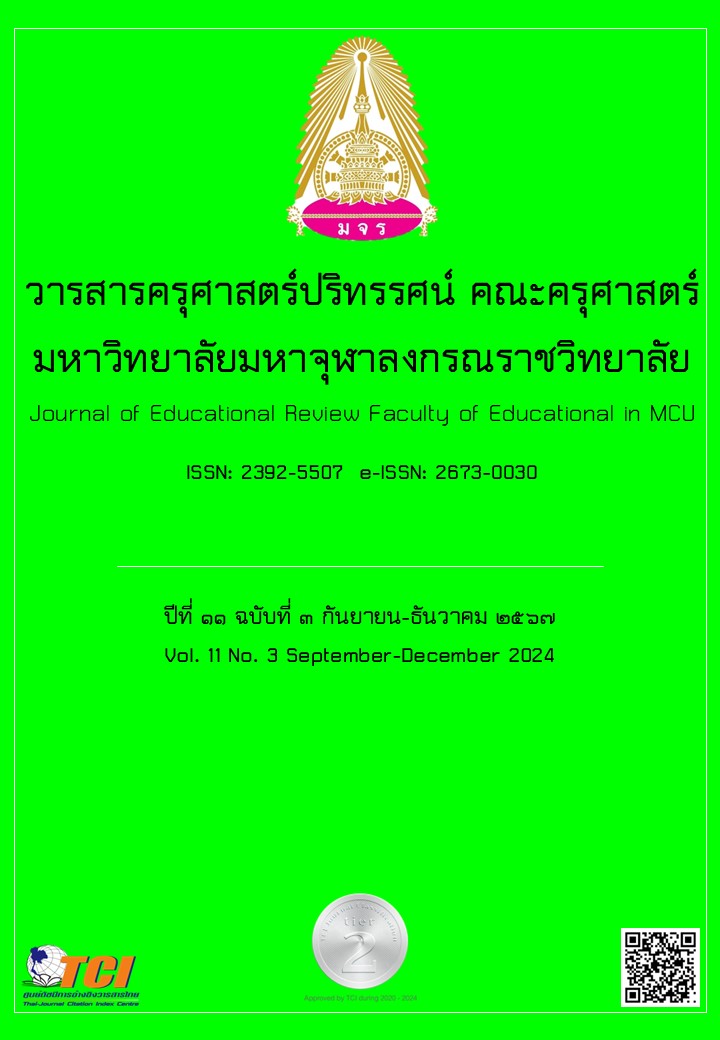GUIDELINES FOR MANAGING EDUCATIONAL INSTITUTIONS ACCORDING TO THE PRINCIPLES OF SUFFICIENCY ECONOMY NA YANG SUBDISTRICT NETWORK GROUP PHETCHABURI PROVINCE
Main Article Content
Abstract
This research aims to 1) study the administration of educational institutions in the Na Yang Sub-district Network Group, 2) study the administration methods of educational institutions according to the philosophy of sufficiency economy, and 3) propose guidelines for administration of educational institutions according to the philosophy of sufficiency economy. This research is a mixed-methods study. In terms of a quantitative research, using a questionnaire of the entire population in the research, 106 people. Data were analyzed using statistics, including mean and standard deviation, and qualitative research by interviewing 5 key informants. Data were analyzed using content analysis. The research results found that 1) The overall administration conditions of educational institutions in the Na Yang Sub-district Network Group, Phetchaburi Province, were at a high level. When considering each aspect, opinions were at a high level in all 4 aspects, namely, personnel development, educational institution administration, teaching curriculum, and student development activities, respectively. 2) The administration methods of educational institutions according to the philosophy of sufficiency economy in the Na Yang Sub-district Network Group consisted of (1) Educational institution administration, organizing meetings to explain and providing understanding to personnel to create and see the value of sufficiency. (2) Teaching curriculum, integrating all learning curricula in all subject groups and learning from role models of sufficiency. (3) Student development activities, organizing the learning activities on the principles of sufficiency economy to build immunity for students under the conditions of knowledge (4) Personnel development, organizing a personnel development project to train and develop knowledge on the principles of sufficiency economy for personnel to build immunity and develop morality, namely honesty and integrity, and living life with mindfulness. 3) Guidelines for implementing the principles of sufficiency economy were as following: (1) Moderation and appropriateness; Administrators and educational personnel must practice and develop learners to obtain the desired characteristics according to the curriculum. (2) Reasoning; Administrators and teachers' decisions on the level of sufficiency must be rational, considering the causes and factors related to the administration and development of personnel of the educational institution. (3) Immunity; Preparing to be ready for the impacts and changes in administration carefully that were expected to occur in the era of digital transformation. (4) Knowledge condition; Administrators and educational personnel must be eager to learn, having the initiative to develop themselves to build immunity. (5) Morality condition; Administrators provided guidelines for personnel to practice in order to abandon evil and develop the mind to be kind, honest, and using wisdom in life.
Article Details

This work is licensed under a Creative Commons Attribution-NonCommercial-NoDerivatives 4.0 International License.
ทัศนะและความคิดเห็นที่ปรากฏในบทความในวารสารฉบับนี้ถือเป็นความรับผิดชอบของผู้เขียนบทความนั้นเพียงผู้เดียว และไม่ถือเป็นทัศนะและความรับผิดชอบของกองบรรณาธิการ
กองบรรณาธิการขอสงวนสิทธิ์ในการคัดเลือกบทความลงตีพิมพ์และจะแจ้งให้เจ้าของบทความทราบหลังจากผู้ประเมินบทความตรวจอ่านบทความแล้ว
ต้นฉบับที่ได้รับการตีพิมพ์ในวารสารครุศาสตร์ปริทรรศน์ คณะครุศาสตร์ มหาวิทยาลัยมหาจุฬาลงกรณราชวิทยาลัย ถือเป็นกรรมสิทธิ์ของคณะครุศาสตร์ มหาวิทยาลัยมหาจุฬาลงกรณราชวิทยาลัย ห้ามนำข้อความทั้งหมดหรือบางส่วนไปพิมพ์ซ้ำ เว้นเสียแต่ว่าจะได้รับอนุญาตจากมหาวิทยาลัยฯ เป็นลายลักษณ์อักษร
References
กระทรวงศึกษาธิการ. (2550). ผลการดำเนินงานขับเคลื่อนปรัชญาเศรษฐกิจพอเพียงสู่ สถานศึกษา ปีงบประมาณ 2550. กรุงเทพมหานคร: กระทรวงศึกษาธิการ.
กุศาวดี บุญนำ. (2565). แนวทางการพัฒนาการเรียนรู้ในยุคฐานวิถีชีวิตใหม่ตามหลักปรัชญาเศรษฐกิจพอเพียงของโรงเรียนประถมศึกษา อำเภอหนองเสือ จังหวัดปทุมธานี. วิทยานิพนธ์ครุศาสตรมหาบัณฑิต. มหาวิทยาลัยมหาจุฬาลงกรณราชวิทยาลัย.
เกษม วัฒนชัย. (2566). ปรัชญาเศรษฐกิจพอเพียงคืออะไร. แหล่งที่มา http:// www.rdpb.go.th/th/Sufficiency สืบค้นเมื่อ 12 มิ.ย. 2566.
เทวิล ศรีสองเมือง. (2551). การพัฒนารูปแบบเครือข่ายการจัดการเรียนการสอนตามปรัชญาของเศรษฐกิจพอเพียงในสถานศึกษาขั้นพื้นฐาน. วิทยานิพนธ์ครุศาสตรมหาบัณฑิต. จุฬาลงกรณ์มหาวิทยาลัย.
ปรียานุช พิบูลสราวุธ. (2550). การขับเคลื่อนเศรษฐกิจพอเพียงด้านการศึกษา. พิมพ์ครั้งที่ 2.กรุงเทพมหานคร: สำนักงานทรัพย์สินส่วนพระมหากษัตริย์.
พระมหาไชยถนอม ชยธมฺโม (หาระสาย). (2559). การส่งเสริมศีลธรรมตามหลักปรัชญาเศรษฐกิจพอเพียงของโรงเรียนในสังกัดสำนักงานเขตบางซื่อ กรุงเทพมหานคร. วิทยานิพนธ์พุทธศาสตรมหาบัณฑิต. มหาวิทยาลัยมหาจุฬาลงกรณราชวิทยาลัย.
สุภาภรณ์ โสภา. (2564). แนวทางการดำรงชีวิตวิถีใหม่ตามหลักปรัชญาเศรษฐกิจพอเพียงของประชาชน เขตเทศบาลนครสุราษฎร์ธานี. วารสารสังคมศาสตร์และมานุษยวิทยาเชิงพุทธ. 6(10). 1-2.
สุรยุทธ์ จุลานนท์. (2566). ปรัชญาเศรษฐกิจพอเพียงคืออะไร. แหล่งที่มา http:// www.rdpb.go.th/th/Sufficiency สืบค้นเมื่อ 12 มิ.ย 2566.
เสาวลักษณ์ มาพร. (2550). ความพร้อมในการนำหลักปรัชญาเศรษฐกิจพอเพียงไปจัดการศึกษาในสถานศึกษา สังกัดสำนักงานเขตพื้นที่การศึกษาขอนแก่น เขต 1. วิทยานิพนธ์ศึกษาศาสตรมหาบัณฑิต. มหาวิทยาลัยขอนแก่น.
อำพน กิตติอำพน. (2550). ปรัชญาของเศรษฐกิจพอเพียงสังคมไทย. กรุงเทพมหานคร: สำนักงานคณะกรรมการพัฒนาเศรษฐกิจและสังคมแห่งชาติ.


